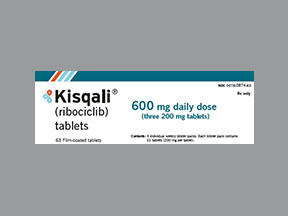
Kisqali (600 Mg Dose) Coupons & Savings Card – Discount Prices from $6119.64
Ribociclib is used to treat breast cancer. It works by slowing or stopping the growth of cancer cells.
Our Kisqali (600 Mg Dose) coupons are free to use. You can print the coupon, email it to yourself, or receive the Kisqali (600 Mg Dose) coupon via text message. To get your free discount, show the pharmacist your Kisqali (600 Mg Dose) savings card which has the discounted coupon price. Use our filters below to edit the prescription box to match your needs. The Kisqali (600 Mg Dose) prices will update based on your prescription needs. Above our Kisqali (600 Mg Dose) coupons, you can change the location to see pharmacy prices in other areas. Our prescription discount card will update online with the specific pharmacy costs associated with your edits. Be sure to text, email, or print the Kisqali (600 Mg Dose) savings card code that you need after editing the prescription box and location field. Show the discount card to your pharmacist before paying.
My prescription
Edit
200MG, Kisqali (600 Mg Dose) (21 Tablet Therapy Packs)
Select pharmacy

Albertsons
$6119.64
COUPON PRICE
Walgreens
$6542.91
COUPON PRICE
Walmart
$6616.17
COUPON PRICEKisqali (600 Mg Dose) savings card
Show this card to your pharmacist
Albertsons
$6119.64
BIN
ID
PCN
GRP
019876
LHD18AB33E
CHIPPO
LHX
Powered by
Ribociclib is used to treat breast cancer. It works by slowing or stopping the growth of cancer cells.
Our Kisqali (600 Mg Dose) coupons are free to use. You can print the coupon, email it to yourself, or receive the Kisqali (600 Mg Dose) coupon via text message. To get your free discount, show the pharmacist your Kisqali (600 Mg Dose) savings card which has the discounted coupon price. Use our filters below to edit the prescription box to match your needs. The Kisqali (600 Mg Dose) prices will update based on your prescription needs. Above our Kisqali (600 Mg Dose) coupons, you can change the location to see pharmacy prices in other areas. Our prescription discount card will update online with the specific pharmacy costs associated with your edits. Be sure to text, email, or print the Kisqali (600 Mg Dose) savings card code that you need after editing the prescription box and location field. Show the discount card to your pharmacist before paying.
Kisqali (600 Mg Dose) FAQs
Using the SaveHealth discount card, what is the price of Kisqali (600 Mg Dose) without insurance?
Using the SaveHealth discount card, the price of Kisqali (600 Mg Dose) without insurance is $6119.64.
What is the price of Kisqali (600 Mg Dose) at Walgreens?
The price of Kisqali (600 Mg Dose) at Walgreens is $6542.91.
What is the price of Kisqali (600 Mg Dose) at Walmart?
The price of Kisqali (600 Mg Dose) at Walmart is $6616.17.
